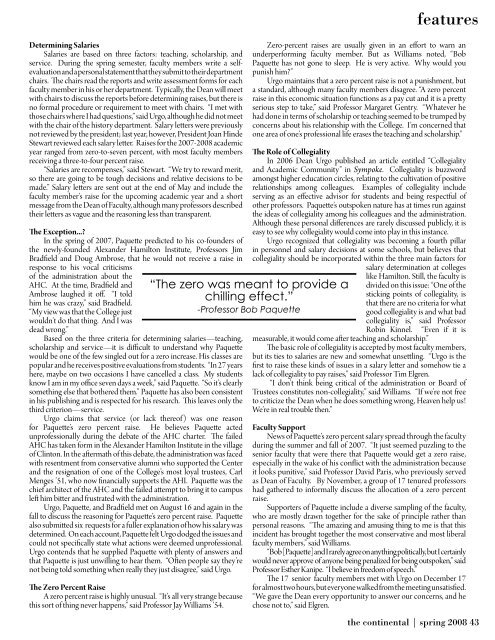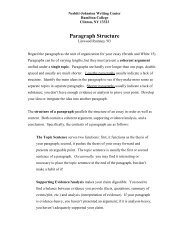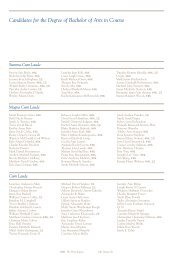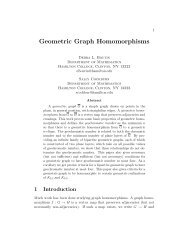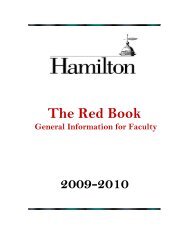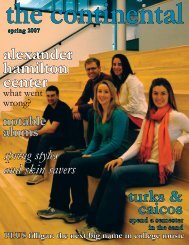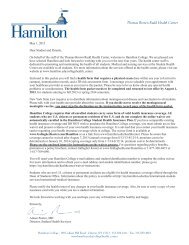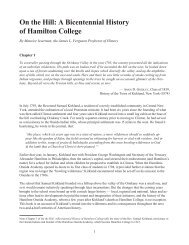The Continental - Hamilton College
The Continental - Hamilton College
The Continental - Hamilton College
You also want an ePaper? Increase the reach of your titles
YUMPU automatically turns print PDFs into web optimized ePapers that Google loves.
Determining SalariesSalaries are based on three factors: teaching, scholarship, andservice. During the spring semester, faculty members write a selfevaluationand a personal statement that they submit to their departmentchairs. <strong>The</strong> chairs read the reports and write assessment forms for eachfaculty member in his or her department. Typically, the Dean will meetwith chairs to discuss the reports before determining raises, but there isno formal procedure or requirement to meet with chairs. “I met withthose chairs where I had questions,” said Urgo, although he did not meetwith the chair of the history department. Salary letters were previouslynot reviewed by the president; last year, however, President Joan HindeStewart reviewed each salary letter. Raises for the 2007-2008 academicyear ranged from zero-to-seven percent, with most faculty membersreceiving a three-to-four percent raise.“Salaries are recompenses,” said Stewart. “We try to reward merit,so there are going to be tough decisions and relative decisions to bemade.” Salary letters are sent out at the end of May and include thefaculty member’s raise for the upcoming academic year and a shortmessage from the Dean of Faculty, although many professors describedtheir letters as vague and the reasoning less than transparent.<strong>The</strong> Exception...?In the spring of 2007, Paquette predicted to his co-founders ofthe newly-founded Alexander <strong>Hamilton</strong> Institute, Professors JimBradfield and Doug Ambrose, that he would not receive a raise inresponse to his vocal criticismsof the administration about theAHC. At the time, Bradfield andAmbrose laughed it off. “I toldhim he was crazy,” said Bradfield.“My view was that the <strong>College</strong> justwouldn’t do that thing. And I wasdead wrong.”Based on the three criteria for determining salaries—teaching,scholarship and service—it is difficult to understand why Paquettewould be one of the few singled out for a zero increase. His classes arepopular and he receives positive evaluations from students. “In 27 yearshere, maybe on two occasions I have cancelled a class. My studentsknow I am in my office seven days a week,” said Paquette. “So it’s clearlysomething else that bothered them.” Paquette has also been consistentin his publishing and is respected for his research. This leaves only thethird criterion—service.Urgo claims that service (or lack thereof ) was one reasonfor Paquette’s zero percent raise. He believes Paquette actedunprofessionally during the debate of the AHC charter. <strong>The</strong> failedAHC has taken form in the Alexander <strong>Hamilton</strong> Institute in the villageof Clinton. In the aftermath of this debate, the administration was facedwith resentment from conservative alumni who supported the Centerand the resignation of one of the <strong>College</strong>’s most loyal trustees, CarlMenges ’51, who now financially supports the AHI. Paquette was thechief architect of the AHC and the failed attempt to bring it to campusleft him bitter and frustrated with the administration.Urgo, Paquette, and Bradfield met on August 16 and again in thefall to discuss the reasoning for Paquette’s zero percent raise. Paquettealso submitted six requests for a fuller explanation of how his salary wasdetermined. On each account, Paquette felt Urgo dodged the issues andcould not specifically state what actions were deemed unprofessional.Urgo contends that he supplied Paquette with plenty of answers andthat Paquette is just unwilling to hear them. “Often people say they’renot being told something when really they just disagree,” said Urgo.<strong>The</strong> Zero Percent RaiseA zero percent raise is highly unusual. “It’s all very strange becausethis sort of thing never happens,” said Professor Jay Williams ’54.“<strong>The</strong> zero was meant to provide achilling effect.”-Professor Bob PaquettefeaturesZero-percent raises are usually given in an effort to warn anunderperforming faculty member. But as Williams noted, “BobPaquette has not gone to sleep. He is very active. Why would youpunish him?”Urgo maintains that a zero percent raise is not a punishment, buta standard, although many faculty members disagree. “A zero percentraise in this economic situation functions as a pay cut and it is a prettyserious step to take,” said Professor Margaret Gentry. “Whatever hehad done in terms of scholarship or teaching seemed to be trumped byconcerns about his relationship with the <strong>College</strong>. I’m concerned thatone area of one’s professional life erases the teaching and scholarship.”<strong>The</strong> Role of CollegialityIn 2006 Dean Urgo published an article entitled “Collegialityand Academic Community” in Sympoke. Collegiality is buzzwordamongst higher education circles, relating to the cultivation of positiverelationships among colleagues. Examples of collegiality includeserving as an effective advisor for students and being respectful ofother professors. Paquette’s outspoken nature has at times run againstthe ideas of collegiality among his colleagues and the administration.Although these personal differences are rarely discussed publicly, it iseasy to see why collegiality would come into play in this instance.Urgo recognized that collegiality was becoming a fourth pillarin personnel and salary decisions at some schools, but believes thatcollegiality should be incorporated within the three main factors forsalary determination at collegeslike <strong>Hamilton</strong>. Still, the faculty isdivided on this issue: “One of thesticking points of collegiality, isthat there are no criteria for whatgood collegiality is and what badcollegiality is,” said ProfessorRobin Kinnel. “Even if it ismeasurable, it would come after teaching and scholarship.”<strong>The</strong> basic role of collegiality is accepted by most faculty members,but its ties to salaries are new and somewhat unsettling. “Urgo is thefirst to raise these kinds of issues in a salary letter and somehow tie alack of collegiality to pay raises,” said Professor Tim Elgren.“I don’t think being critical of the administration or Board ofTrustees constitutes non-collegiality,” said Williams. “If we’re not freeto criticize the Dean when he does something wrong, Heaven help us!We’re in real trouble then.”Faculty SupportNews of Paquette’s zero percent salary spread through the facultyduring the summer and fall of 2007. “It just seemed puzzling to thesenior faculty that were there that Paquette would get a zero raise,especially in the wake of his conflict with the administration becauseit looks punitive,” said Professor David Paris, who previously servedas Dean of Faculty. By November, a group of 17 tenured professorshad gathered to informally discuss the allocation of a zero percentraise.Supporters of Paquette include a diverse sampling of the faculty,who are mostly drawn together for the sake of principle rather thanpersonal reasons. “<strong>The</strong> amazing and amusing thing to me is that thisincident has brought together the most conservative and most liberalfaculty members,” said Williams.“Bob [Paquette] and I rarely agree on anything politically, but I certainlywould never approve of anyone being penalized for being outspoken,” saidProfessor Esther Kanipe. “I believe in freedom of speech.”<strong>The</strong> 17 senior faculty members met with Urgo on December 17for almost two hours, but everyone walked from the meeting unsatisfied.“We gave the Dean every opportunity to answer our concerns, and hechose not to,” said Elgren.the continental | spring 2008 43


